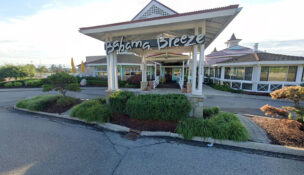Va. casinos report almost $53M in January revenue
Taxes from three casinos total $9.5M


Va. casinos report almost $53M in January revenue
Taxes from three casinos total $9.5M
January gaming revenues from Virginia’s three casinos totaled $52.86 million, according to Virginia Lottery data released Thursday.
Virginia’s first casino, the Bristol Casino: Future Home of Hard Rock temporary facility, opened July 2022. The Virginia Lottery Board approved HR Bristol‘s casino license in April 2022. Last month, the Bristol casino generated about $9.9 million from its 911 slots and almost $2.17 million from its 29 table games.
Rivers Casino Portsmouth, Virginia’s first permanent casino, opened in January 2023, after the lottery board approved its license in November 2022. The casino reported about $23.5 million in adjusting gaming revenue (wagers minus winnings), of which about $15.66 million came from its 1,466 slots and the remaining $7.88 million from its 81 table games.
The temporary Caesars Virginia casino in Danville opened in May 2023, after receiving its casino license in April 2023. In January, Caesars Virginia held a topping-off ceremony for the 12-story hotel that will be part of the permanent resort casino slated to open late this year. Last month, the casino reported $12.34 million in revenue from its 808 slots and almost $4.9 million from its 33 table games, for a total of roughly $17 million.
January’s casino gaming revenues were a 9.66% decrease from the $58.5 million reported in December 2023.
Virginia law assesses a graduated tax on a casino’s adjusted gaming revenue. For the month of January, taxes from casino AGRs totaled $9.5 million.
The host cities of Portsmouth and Danville received 6% of their respective casinos’ AGRs: $1.4 million for Portsmouth and $1.03 million for Danville. For the Bristol casino, 6% of its adjusted gaming revenue — about $724,677 last month — goes to the Regional Improvement Commission, which the General Assembly established to distribute Bristol casino tax funds throughout Southwest Virginia.
Near the end of 2023, Portsmouth received 7% of the Rivers Casino Portsmouth’s AGR. Under Virginia law, 6% of a casino operator’s AGR goes to its host locality until the operator passes $200 million in AGR for the year, at which point the host locality’s tax rate rises to 7%. If an operator passes $400 million in AGR in the calendar year, that rises to 8%. The Portsmouth casino crossed the $200 million threshold in October 2023, so Portsmouth received 7% of the casino’s AGR for part of October and all of November and December.
The Problem Gambling Treatment and Support Fund receives 0.8% of total taxes, which was about $76,000 last month. The Family and Children’s Trust Fund receives 0.2% of the monthly total, about $19,000 in January.
One other casino has received voter approval and is currently underway in Virginia: the $500 million HeadWaters Resort & Casino in Norfolk. The developers — a partnership between the King William-based Pamunkey Indian Tribe and Tennessee billionaire Jon Yarbrough — submitted new plans to the city, aiming to start continuous, rather than phased, construction in spring 2024.
The Norfolk Architectural Review Board is the first body to review plans in the approval process, which ends with the Norfolk City Council. The board was set to review the new plans in its Jan. 8 meeting, but developers continued the review until the board’s Jan. 22 meeting and then continued the review indefinitely.
“The Pamunkey Tribe has continued to work diligently with its architecture and engineering teams to produce the additional design work necessary to address the direction provided by [Norfolk] City Council. Until that work is completed, we have asked for a continuance before the ARB,” Jay Smith, spokesman for HeadWaters Resort & Casino, said in a statement after the Jan. 22 meeting.
“As soon as we are confident that the plans meet the needs of the city and Tribe, we will ask to be put on the ARB agenda,” Smith said in the statement. “We know so many residents of Norfolk share our eagerness to open HeadWaters Resort & Casino, and once design is completed, we will employ an aggressive construction schedule to bring this project to life.”
Following Richmond voters’ rejection of a proposed $562 million casino for the second time, Petersburg lawmakers sought to hold a referendum in their city. A bill that would allow Petersburg to do so by amending the eligibility requirements for host cities has passed the Virginia Senate but still faces the House of Delegates.
g
















